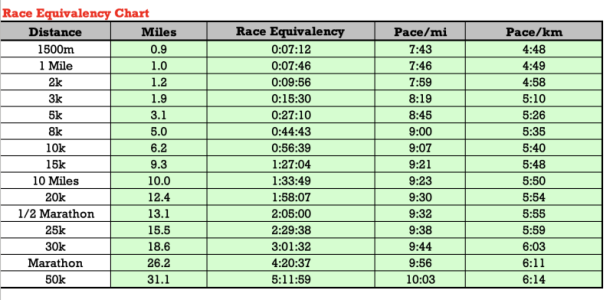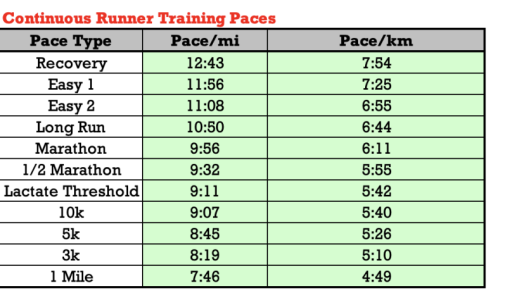If your goal is HM and less, then my #1 recommendation that I've seen the most progress from by others and myself is the Daniels 5k/10k plan from his 3rd edition book (
Daniels Running Formula).
If your current fitness is 2:05 HM, then the pacing my calculator suggests is:
View attachment 721532
View attachment 721531
The recommendation is 80% of training should be at 10:50 min/mile or slower. Your average pace each week should end up around 11:10 min/mile or so.
Here are some of my favorite scientifically based resources:
Hansons - Principles of pacing, training plan design, during marathon carbohydrate calculations (
Hansons Marathon Method)
Stephen Seiler - Principles of balance in training plans (80% Easy and 20% Hard) (
Seiler; and Fitzgerald -
80/20 Running)
Jack Daniels - Principles of maximum duration training per session, 5K training (
Daniels Running Formula)
Arthur Lydiard - Principles of Specialization
Steve Magness - Principles of Adaptation and Principles of choosing what type of training is best for an individual (
Science of Running)
Jeff Gaudette - Running technique (foot strike, breathing, shoulders, arms, eyesight), Principles of Aerobic and Anaerobic running and why warm-ups are important (runnersconnect.net;
podcast)
Samuele Marcora - Psychobiological Model (motivation and perception of effort) (Countless scientific articles; or Fitzgerald -
How Bad do you want it?)
Benjamin Rapoport - During marathon carbohydrate calculations (
Rapoport)
Timothy Fairchild - Western Australian carbohydrate loading procedure for pre-running carb loading (
Fairchild)
Hadd - Principles of choosing what type of training is best for an individual (
Hadd's Approach to Distance Running)
Pete Magill - 5K training (
Runners World)
Hansons Marathon Method - Luke Humphrey (very informative)
Advanced Marathoning - Pete Pfitzinger (good resource)
Daniel's Running Formula - Jack Daniels (favorite book)
Science of Running - Steve Magness (extremely dense and difficult to read at some times)
Racing Weight Cookbook - Matt Fitzgerald (amazing recipes)
Performance Nutrition for Runners - Matt Fitzgerald (meh, didn't really learn anything)
Marieb, E.N. The reproductive system. In: Human Anatomy and Physiology, E.N. Marieb. Menlo Park, CA: Benjamin/Cummings Science Publishing, 1998, pp. 1056- 1061.
Hawley JA, Schabort EJ, Noakes TD, Dennis SC. Carbohydrate-loading and exercise performance. An update. Sports Med. 1997 Aug;24(2):73-81. Review. PubMed PMID: 9291549.
James AP, Lorraine M, Cullen D, Goodman C, Dawson B, Palmer TN, Fournier PA. Muscle glycogen supercompensation: absence of a gender-related difference. Eur J Appl Physiol. 2001 Oct;85(6):533-8. PubMed PMID: 11718281.
Tarnopolsky MA, Zawada C, Richmond LB, Carter S, Shearer J, Graham T, Phillips SM. Gender differences in carbohydrate loading are related to energy intake. J Appl Physiol (1985). 2001 Jul;91(1):225-30. PubMed PMID: 11408434.
Sedlock DA. The latest on carbohydrate loading: a practical approach. Curr Sports Med Rep. 2008 Jul-Aug;7(4):209-13. doi: 10.1249/JSR.0b013e31817ef9cb. PubMed PMID: 18607222.
Goforth HW Jr, Laurent D, Prusaczyk WK, Schneider KE, Petersen KF, Shulman GI. Effects of depletion exercise and light training on muscle glycogen supercompensation in men. Am J Physiol Endocrinol Metab. 2003 Dec;285(6):E1304-11. Epub 2003 Aug 5. PubMed PMID: 12902321; PubMed Central PMCID: PMC2995524.
Fairchild TJ, Fletcher S, Steele P, Goodman C, Dawson B, Fournier PA. Rapid carbohydrate loading after a short bout of near maximal-intensity exercise. Med Sci Sports Exerc. 2002 Jun;34(6):980-6. PubMed PMID: 12048325.
Bussau VA, Fairchild TJ, Rao A, Steele P, Fournier PA. Carbohydrate loading in human muscle: an improved 1 day protocol. Eur J Appl Physiol. 2002 Jul;87(3):290-5. Epub 2002 May 28. PubMed PMID: 12111292.
Tarnopolsky, M.A., S.A. Atkinson, S.M. Phillips, and J.D. MacDougall. Carbohydrate loading and metabolism during exercise in men and women. J. Appl. Physiol. 78:1360Y1368, 1995.
Walker, J.L., J.F. Heigenhauser, E. Hultman, and L.L. Spriet. Dietary carbohydrate, muscle glycogen content, and endurance performance in well-trained women. J. Appl. Physiol. 88:2151Y2158, 2000.
Andrews, J.L., D.A. Sedlock, M.G. Flynn, et al. Carbohydrate loading and supplementation in endurance-trained women runners. J. Appl. Physiol. 95:584Y590, 2003.
Nicklas, B.J., A.C. Hackney, and R.L. Sharp. The menstrual cycle and exercise: performance, muscle glycogen, and substrate response. Int. J. Sports Med. 10:264Y269, 1989.
McLay, R.T., C.D. Thomson, S.M. Williams, and N.J. Rehrer. Carbohydrate loading and female endurance athletes: effect of
menstrual-cycle phase. Int. J. Sport Nutr. Exerc. Metab. 17:189Y205, 2007.
Paul, D.R., S.M. Mulroy, J.A. Horner, et al. Carbohydrate-loading during the follicular phase of the menstrual cycle: effects on muscle glycogen and exercise performance. Int. J. Sport Nutr. Exerc. Metab. 11:430Y441, 2001.
Rapoport BI. Metabolic factors limiting performance in marathon runners. PLoS Comput Biol. 2010 Oct 21;6(10):e1000960. doi: 10.1371/journal.pcbi.1000960. PubMed PMID: 20975938; PubMed Central PMCID: PMC2958805.
Humphrey, L. [Hanson's Coaching Services]. (2013, Nov 23). Calculating Caloric Needs for Marathon- Updated 11/22/2013 . [Video File].
Jentjens RLPG, Wagenmakers AJM, Jeukendrup AE: Heat stress increases muscle glycogen use but reduces the oxidation of ingested carbohydrates during exercise. J Appl Physiol 2002, 92:1562–1572.



